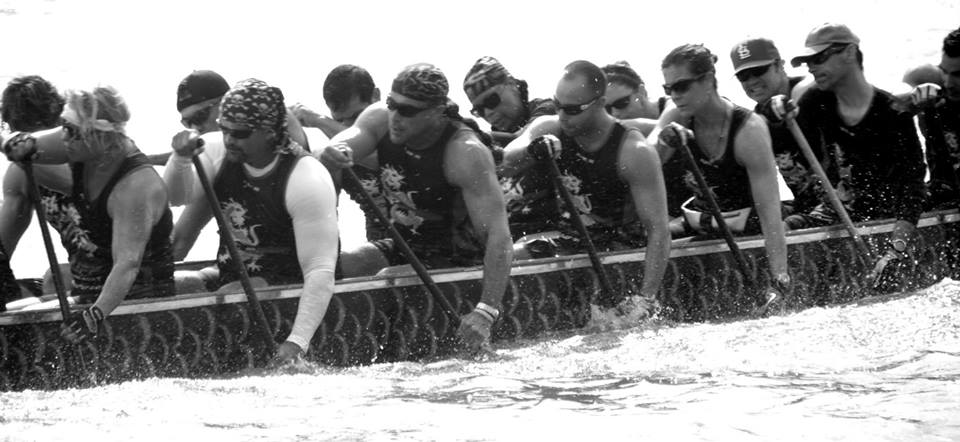The Difference Between Success and Failure | How to Ensure Your Success in Dragon Boat Racing
Posted by Kristin Stickels on
As competitive adults in a competitive sport, we see paddlers of varying talents either develop into top-notch athletes or hamper their own progress. How is that an athlete with mediocre ability can develop into an excellent paddler, yet a paddler with incredible talent can stall their own achievement?

Team USA Senior A Mixed, just after finding out we won the gold in the 1000m in Hungary, 2013. Photo: Rafael Veve
First, let’s take a look at why athletes with average talent can do so well in their sport:
1) They work hard. This is worth repeating. They work HARD. Have you ever noticed that when things are simply handed to people, they do not tend to value these things much? The same thing applies to athletics. Quite often, when a sport comes easily to someone, they don’t feel quite as much pleasure in the accomplishments as someone who really had to overcome adversity in order to succeed. These athletes value hard work and effort and are willing to train hard to make improvements. They are determined to succeed and understand the path that they need to take in order to get there.
2) They are coachable. No matter where they are in their progress, no matter how good they become, these athletes are always coachable. What does this mean? They listen to their coach. They take the coach’s words to heart. They make a sincere effort to adjust their technique, and do not give excuses. They approach being coached as a positive thing and a chance to improve.
3) They practice hard. These athletes attend practice regularly and spend the time at practice really focusing on executing improvements. They concentrate on the areas that they know are their weak points and establish a pattern of growth to increase their performance. Each practice session is seen as an opportunity, not a burden.
4) They value their roles on the team. Regardless of whether they are a starter, a spare, or are still trying to make the race boat, these athletes honor the team. Their appreciation of being part of the “we” of the team far surpasses their personal objectives. They are proud members of their team and promote and support the success of the team in whatever way they can.
5) They do all the little things well. These are all the small things that typically go unnoticed, yet are so crucial to the functioning of the team. They show up on time. They don’t complain or make excuses. They are always race-ready. They lend a hand. They look out for their teammates. They are focused when necessary. They are flexible.
And now let’s consider why some athletes who are incredibly talented may fail.
1) They don’t work hard. They are used to being good at sports and don’t typically have to put too much effort into their training. Talent has always come naturally to them, so they are unaccustomed to the effort required to become a top-level athlete. Unfortunately, as their team’s bar raises, they don’t rise to the occasion and are often left behind.
2) They are selfish. They put the “I” before the “we” of the team and make their own needs a priority. They skip practices, show up late, leave early, and never help out. Their self-centeredness alienates them from the team.
3) They allow their ego to get in the way. They may be a talented athlete, but when they begin thinking that they are above their teammates, they create complications within the team. To race a dragon boat, a team needs at least 20 paddlers. You’ve heard it before: a team is only as strong as its weakest link. No matter how strong a paddler is, the team will never be able to race without the 19 other paddlers.
4) They listen to the wrong people and maintain a toxic circle. An athlete’s talent may give him or her an opportunity, but making wrong choices can shut the door. Taking advice from the wrong type of people can be destructive. An athlete who allows himself or herself to hang out with the wrong people can be even worse. I call them toxic people. These people are focused on the negatives, they talk badly about the team, the teammates, the coach. They make excuses about why they aren’t making the race boat and they try to lure others into their way of thinking. This negativity snowballs and prevents them from ever making any kind of athletic growth.
5) They are uncoachable. They make excuses for their lack of effort or mistakes in technique. Instead of working to become better, they either believe they are above coaching, or they avoid instances where they might be coached directly (video reviews, training camps, etc.). Sadly, this stagnates their training and does not allow for any advancement.
Yet another model for dragon boating that applies to real life as well.
Contributing writers: Aimee Edwards and Steph Sherwood (Team USA paddlers), and Megan Kress (Team USA Assistant Coach).
Like what you’re reading? Get the best of paddlechica’s blog posts by following my blog!
Find out more about paddlechica.
About the blogger
Kristin Stickels is a three-time Team USA member of the US National Dragon Boat Racing Team. She is the coach of the Miami team Puff, the Florida Tarpons women's team and the local Breast Cancer Survivors' Team (SOS).
She is also an avid outrigger canoe paddler and raced through the Panama Canal on a native cayuco boat from the Atlantic to the Pacific.
Found out more about Hornet paddles at www.hornetwatersports.com
0 comments



